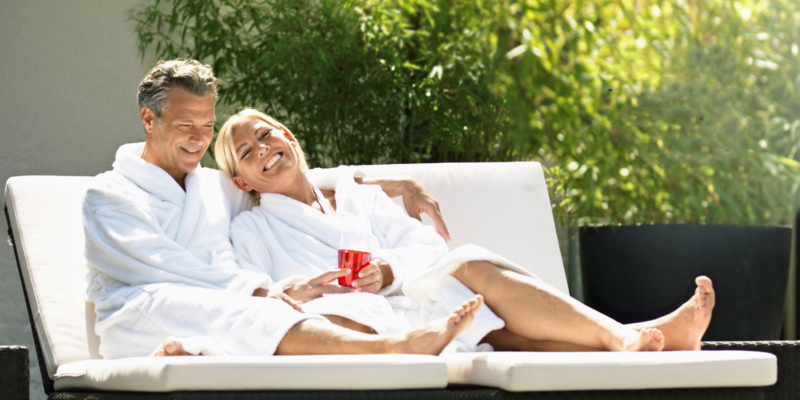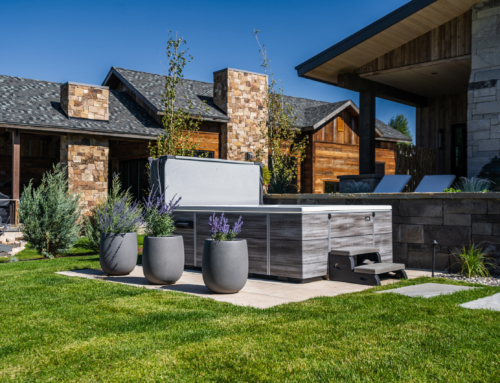A newbie hot tub dealer recently spoke to me about a challenge he’s run into more than once: how to sell health benefits of spas when there really isn’t clear empirical data out there proving the case.
Sure, science has not produced that be-all, end-all study consistently linking hot tub usage to curative care. But does that mean hot tubs can’t improve a person’s health and help them feel better? Absolutely not. The key to positioning yourself as a knowledgeable and trustworthy hot tub expert is to know the difference between what you can and can’t claim when it comes to selling hot tub health benefits.
Several studies published in peer-reviewed medical-science journals have consistently identified that hot water immersion and hydromassage produce different effects on various systems of the body. So while researchers have not necessarily been able to determine the mechanisms by which hot tub use improves certain medical conditions and diseases, it has linked their use to improved health outcomes.
Being the Expert
First, let’s go over what it means to be an expert. Sure, the more you know, the easier it will be to provide reliable information to your customer. But knowledge also works to build one’s self-confidence, a critical trait in becoming an effective sales person. Sharing your knowledge leads to trust, and that trust inevitably leads to more sales.
Sharing your knowledge leads to trust, and that trust inevitably leads to more sales.
And whose trust are we trying to gain? Before we get to the hot tub product, we can recognize a few knowns about consumers walking through our doors these days. We have an aging population where easy access to information and a growing Wellness concept promotes the quick-fix.
As Li Edekoort states, “There is a golden future awaiting all of the industries that can meet peoples’ need for well-being. Taking a major vacation each year will no longer be as important as having a bit of a vacation feeling on an everyday basis—a ‘holiday every day.’” Translation for the hot tub retailer: Opportunity abounds!
Understanding the Physical Effects of Hot Water Immersion
If you’ve been in the spa business long enough, you’re probably familiar with one or more of the health benefits from hot tub usage. To recap, here’s a list of proven health effects brought about from hot water immersion:
- Buoyancy (bodies can be up to 90% lighter in water) relieves pressure on joints and spine.
- Immersion in 102 degrees F increases blood flow by 121%. Blood vessels expand increasing blood flow which carries more oxygen and nutrients throughout the body (aka the Vasodilatation Effect). Increased circulation helps relax tight muscles allowing mobility to arthritic/injured joints.
- Hydrostatic effect of jets on pressure points releases endorphins, the body’s natural painkillers.
- Dopamine, a hormone that causes relaxation, is released.
- Heated water induces artificial fever which activates the immune system.
Being able to effectively communicate these points becomes invaluable when promoting your hot tubs and the spa experience to customers most interested in improving their health and wellness.
Common Indicators for Health-Concerned Hot Tub Shoppers
As a key part of the sales process, good retailers attempt to determine customers’ buying motives early on. This is typically when you’d learn about a specific pain point each customer is looking to address in their potential purchase—i.e., which health issue is bothering them that one of your hot tub products could help with.
Here’s a list of the most common health conditions research has shown can be positively impacted by hydrotherapy, hot water immersion, and/or specific features of the spa experience. Though not necessarily cured, symptoms of each of these health conditions can be treated by one or more of the health benefits described above.
- Arthritis (bone and joint pain)
- Fibromyalgia (bone and joint pain, muscle soreness)
- Fitness Recovery (muscle soreness)
- Injury and Surgical Rehabilitation (bone and joint pain, muscle soreness)
- High Blood Pressure (stress/anxiety)
- Migraines (stress/anxiety)
- Sleep Disorders (bone and joint pain, muscle soreness, stress/anxiety)
Value Proposition any Hot Tub Professional Can (and Should) Offer
One retailer I heard from did not get into hot tubs because of her proclivity for selling. In fact, she often refers to herself as a terrible sales person. The reality is she struggles to sell something if she doesn’t believe in it. Her first foray into spa retailing was connected to helping some friends develop their new hot tub business as a tax consultant. But as she discovered firsthand the difference hot tubs can make in people’s lives, she got the bug and has been selling spas ever since.
Her favorite part of hot tub retail is having customers return to share very similar stories about their spas. She says many initially made the purchase thinking it was a lifestyle product. But their spas quickly become a health necessity they don’t know how they got along without. The most common feedback she receives is the impact hot tub time has made to customers’ quality of sleep, energy level, and alertness. Here are a few of her favorite testimonials.
Mark: HCEA worker who fell off a building and severely injured his back. Pain made it impossible to sleep through the night, but he realized that a 20-minute soak when he couldn’t sleep makes all the difference. Now more than ever, he appreciates his decision to purchase a hot tub rather than the Indian motorcycle he was planning on before the fall.
Gene: Race car driver who was in a car wreck that left him so impaired he could barely walk. He attributes his pain relief during rehab to regular hot tub use and is now walking again (still a bit bitter about the other racer involved in the accident, though!).
Cindy: School teacher with fibromyalgia who has varying levels of physical tolerance and is often sensitive to massages. Found hot tub with jets configured exactly so that her time soaking provided a soothing experience with no discomfort.
It’s wise to get to know your customers and their unique stories. When you have a variety of authentic testimonials you can relate, selling these health benefits becomes almost second nature.
The point here is that selling health benefits can serve as an effective value proposition tool. And it can be as simple as this: Doesn’t the price of healthy living and feeling better far outweigh the cost of owning a spa?
Other Health Benefits Sales Tools
In recent research, SpaRetailer reported that 40% of spa retailers keep articles or studies on spa health benefits in their store to back up their claims. So H2Insider thought it would be useful to put together a list of peer-reviewed research spa dealers could keep on hand for customers.
- Biophysiologic Effects of Warm Water Immersion Bruce E. Becker, Kasee Hildenbrand, Rebekah K. Whitcomb, and James P. Sanders
- Have complementary therapies demonstrated effectiveness in rheumatoid arthritis? Nagore Fernández-Llanio Comella, Meritxell Fernández Matilla, Juan Antonio Castellano Cuesta
- The Effects of a Warm Whirlpool Bath on Pain and Stiffness of Patients with Chronic Stroke Induced Knee Osteoarthritis Kun-Ok Lim, DH, PhD, Dong-Yeop Lee, PT, PhD, Won-Seob Shin, PT, PhD
- A comparison of Kneipp hydrotherapy with conventional physiotherapy in the treatment of osteoarthritis of the hip or knee: protocol of a prospective randomised controlled clinical trial Martin Schencking, Adriane Otto, Tobias Deutsch and Hagen Sandholzer
- Effect of hydrotherapy on the signs and symptoms of delayed onset muscle soreness Joanna Vaile, Shona Halson, Nicholas Gill, Brian Dawson
- Effects of mild-stream bathing on recovery from mental fatigue Kei Mizuno, Masaaki Tanaka, Kanako Tajima, Naoki Okada, Kazumasa Rokushima, Yasuyoshi Watanabe








Leave A Comment